The euro eased slightly after the ECB delivered a widely expected rate cut but retained strong monthly gains. The yen held firm following Japan’s CPI data, while gold and silver pulled back from recent highs as traders booked profits ahead of the Easter holiday.
The U.S. dollar saw modest strength following hawkish Fed signals, despite continued trade tensions and inflation concerns. Sterling extended its rally on a softer inflation print, while market focus shifts to next week’s central bank meetings and trade developments.
| Time | Cur. | Event | Forecast | Previous |
| JPY | Holiday-Good Friday | | | |
| EUR | Holiday-Good Friday | |||
| EUR | Holiday-Good Friday |
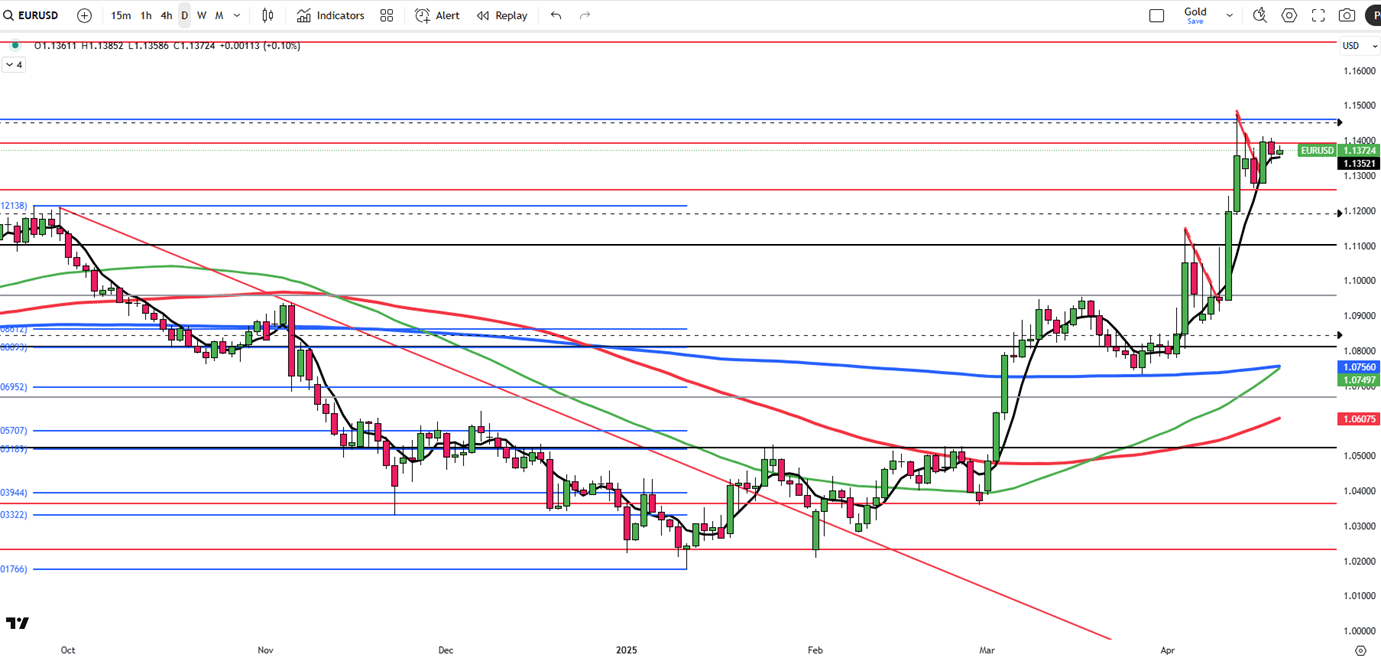
The euro edged down toward $1.13 on Friday, easing slightly from its highest level since January 2022, after the ECB delivered a widely expected rate cut. The central bank lowered the deposit rate by 25 basis points to 2.25%. This marked the sixth consecutive cut and brought the rate to its lowest level since early 2023. The ECB also removed its previous reference to policy being "restrictive" but warned that rising global trade tensions could weaken the growth outlook.
Despite the pullback, the euro has gained around 5% against the dollar in April. The rally has been fueled by growing doubts about the dollar’s global dominance and increased investor preference for the euro. Additional support came from expectations of higher defense spending in the eurozone, particularly in Germany. On Good Friday, with markets quiet, the euro held steady near 1.1370.
Key resistance is at 1.1415, followed by 1.1475 and 1.1500. Support lies at 1.1260, then 1.1180 and 1.1100.
| R1: 1.1415 | S1: 1.1260 |
| R2: 1.1475 | S2: 1.1180 |
| R3: 1.1500 | S3: 1.1100 |
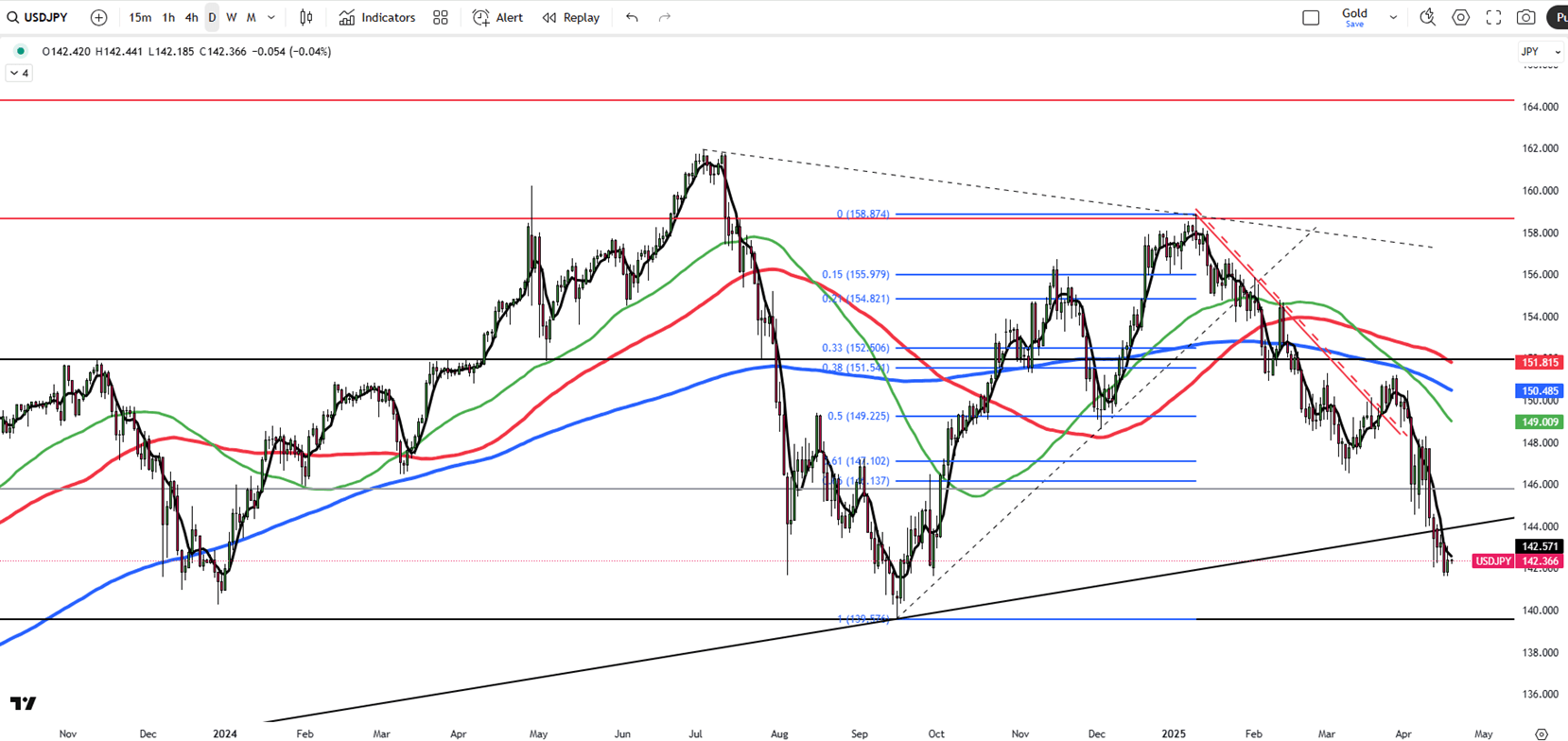
The Japanese yen held around 142.3 per dollar on Friday, near a seven-month high, after inflation data showed headline CPI eased to 3.6% in March and core inflation matched forecasts at 3.2%.
Focus now shifts to next week’s Bank of Japan meeting, where rates are expected to stay at 0.5%. However, growth forecasts may be lowered due to concerns over U.S. tariffs impacting Japan’s export-driven economy. The BOJ is likely to stick with gradual tightening, supported by rising wages and food prices.
Finance Minister Kato denied currency manipulation, saying Japan isn’t deliberately weakening the yen.
Key resistance is at 144.20, with further levels at 148.30 and 152.50. Support stands at 141.80, followed by 141.00 and 139.70.
| R1: 144.20 | S1: 141.80 |
| R2: 148.30 | S2: 141.00 |
| R3: 152.50 | S3: 139.70 |
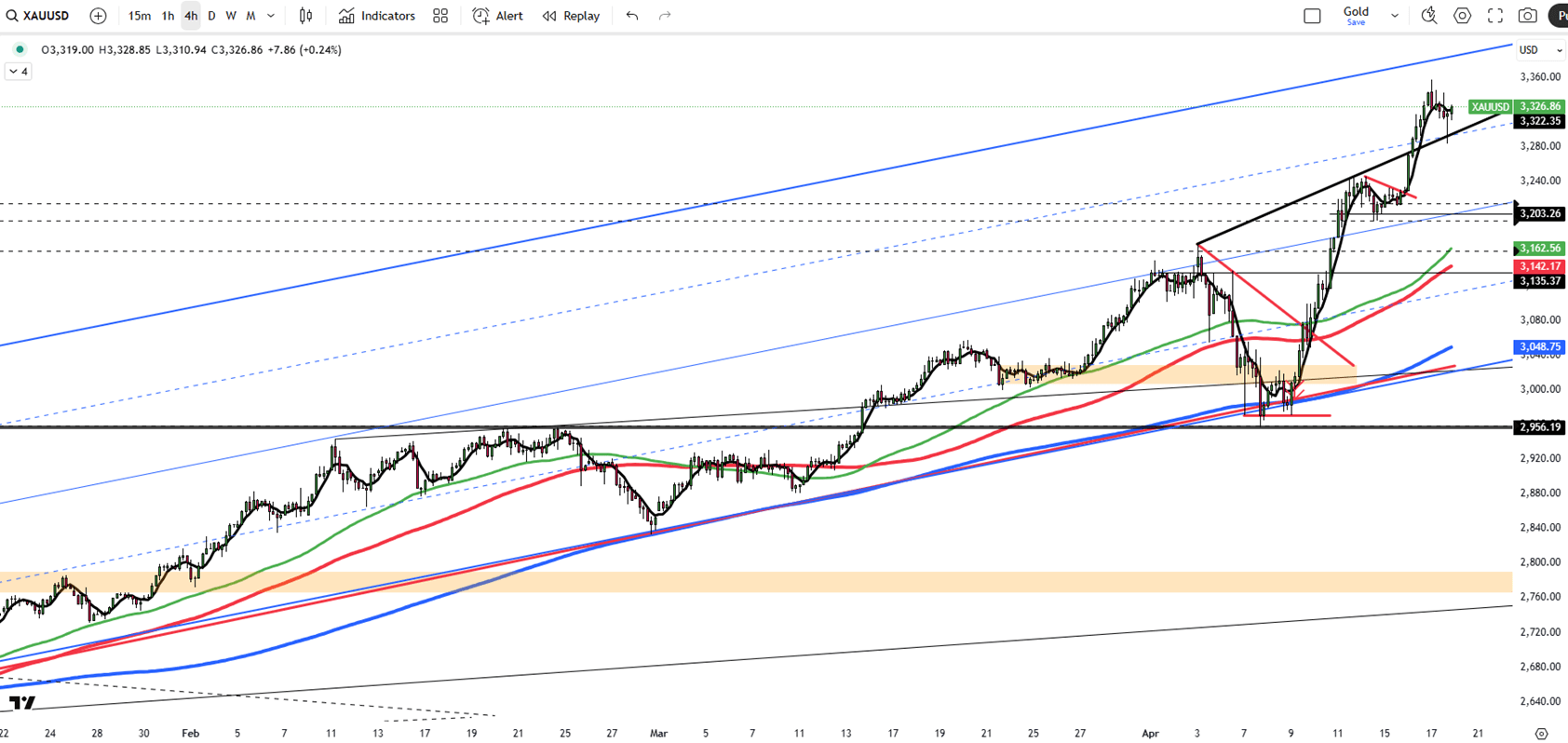
Gold ended the week at $3,226 per ounce on Thursday, as markets closed for Good Friday. Investors took profits after gold hit a record high, driven by safe-haven demand amid U.S. trade policy uncertainty.
The Trump administration is weighing tariffs on semiconductors and pharmaceuticals, while also considering delays to auto tariffs and suspensions on some tech duties. Fed Chair Jerome Powell said the central bank will wait for more clarity before adjusting rates, noting tariffs may raise inflation and slow growth.
U.S.-China trade talks remain in focus, with China open to discussions under certain conditions.
Key resistance is at $3360, followed by $3,380 and $3,400. Support stands at $3290, then $3245 and $3190.
| R1: 3360 | S1: 3290 |
| R2: 3380 | S2: 3245 |
| R3: 3400 | S3: 3190 |
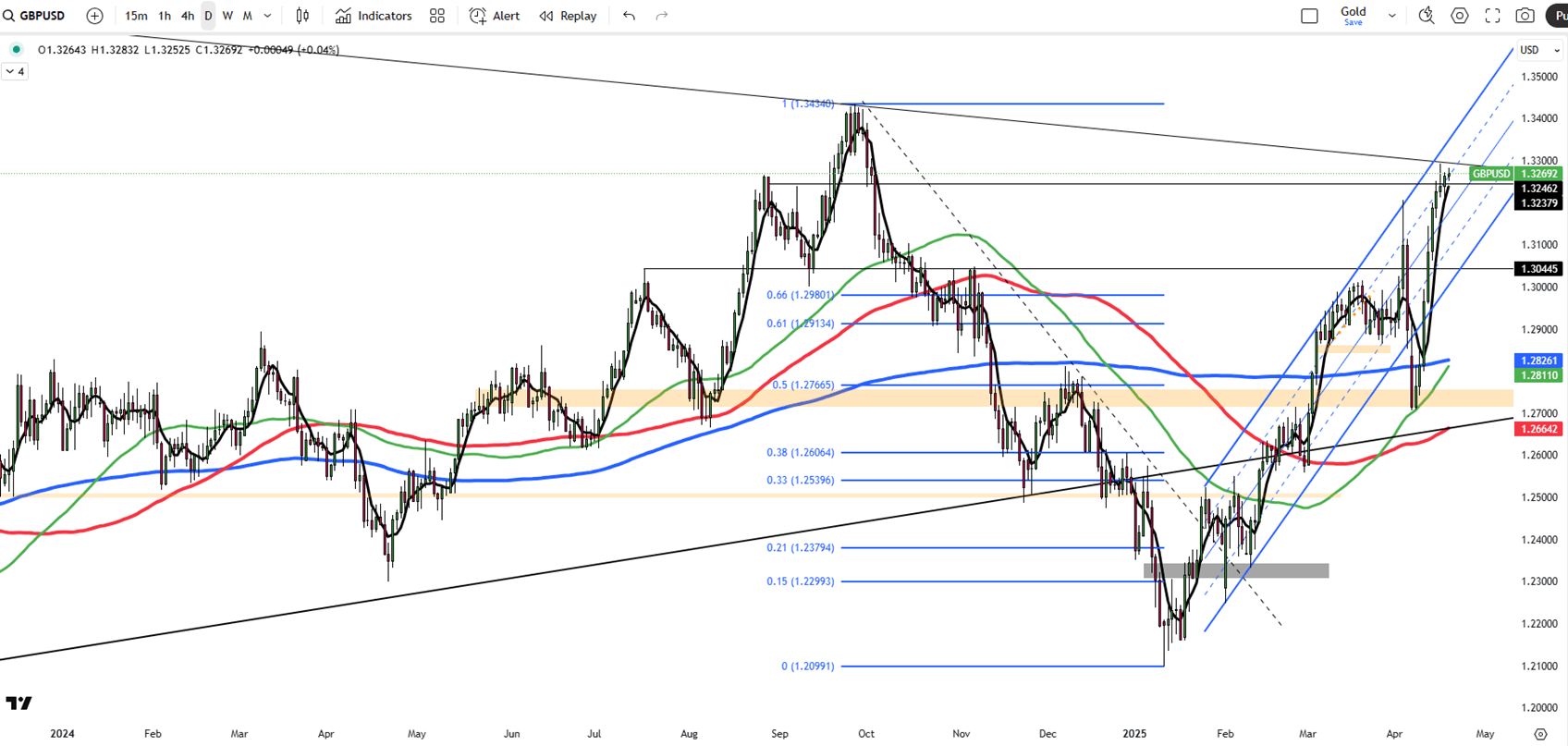
The British Pound advanced for a seventh consecutive session to $1.327, marking its longest rally since July. The move was largely supported by a weaker US dollar, despite softer inflation data from the United Kingdom. Headline consumer prices eased to 2.6 percent, while services inflation slowed to 4.7 percent. This reduced pressure on the Bank of England. Traders have slightly raised expectations for rate cuts, now anticipating 86 basis points of easing by the end of the year. Slower inflation may give the central bank more flexibility to support the economy amid global trade tensions and rising living costs.
If GBP/USD breaks above 1.3270, resistance levels are at 1.3430 and 1.3500. Support is at 1.3015, followed by 1.2900 and 1.2700.
| R1: 1.3270 | S1: 1.3015 |
| R2: 1.3430 | S2: 1.2900 |
| R3: 1.3500 | S3: 1.2700 |
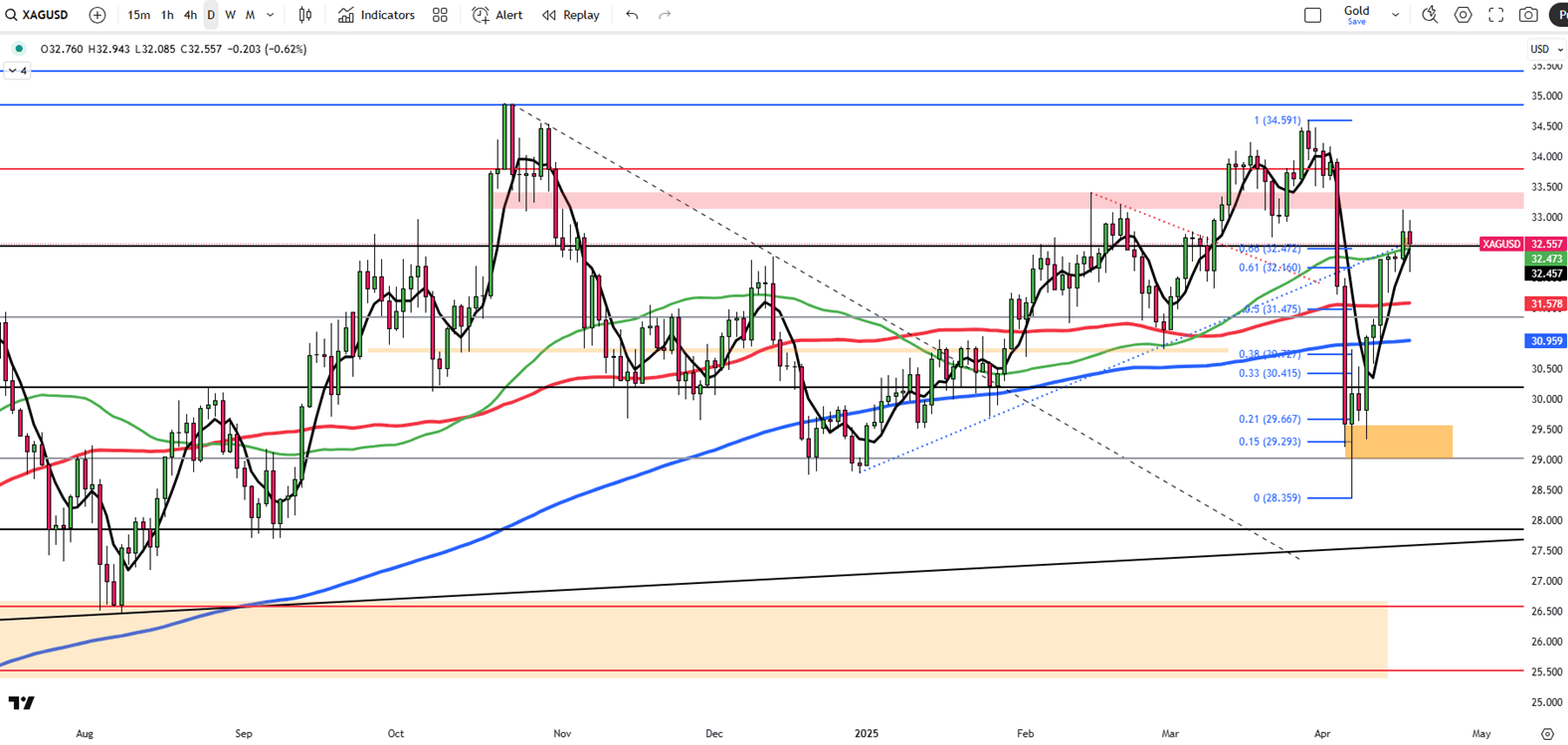
Silver closed at $32.50 per ounce on Thursday, easing from two-week highs as traders booked profits after a strong rally. Markets were quiet due to the Good Friday holiday. Earlier in the week, President Trump launched an investigation into potential new tariffs on minerals, semiconductors, and pharmaceuticals. China signaled a conditional willingness to restart trade talks, requesting clearer policy direction and a fully backed U.S. negotiator. Fed Chair Jerome Powell warned that tariffs could fuel inflation and slow growth, adding that the Fed would wait for more data before adjusting rates.
Technically, resistance is seen at $32.70, followed by $33.15 and $34.20 if broken. Support sits at $31.40, with $30.20 and $29.20 below.
| R1: 32.70 | S1: 31.40 |
| R2: 33.15 | S2: 30.20 |
| R3: 34.20 | S3: 29.00 |
A US court rejected Trump's tariff refund delay as the Dollar (98.5) and 10 year yield (4.04%) held gains amid Middle East escalation and inflation fears.
 After Khamenei: Who Will Lead Iran Next?
After Khamenei: Who Will Lead Iran Next?Following the death of Supreme Leader Ali Khamenei, Iran has entered a pivotal transition phase. Senior officials in Tehran are acting swiftly to uphold the existing structure of the Islamic Republic, prioritizing continuity to head off potential internal instability. Despite these efforts, the sudden leadership vacuum has sparked intense political and military maneuvering behind the scenes.
Detail March Starts With Geopolitical Turmoil (2-6 March)
March Starts With Geopolitical Turmoil (2-6 March)Global markets began the week in a state of high alert following coordinated US and Israeli strikes on Iran over the weekend, which resulted in the death of Supreme Leader Ayatollah Ali Khamenei.
DetailThen Join Our Telegram Channel and Subscribe Our Trading Signals Newsletter for Free!
Join Us On Telegram!